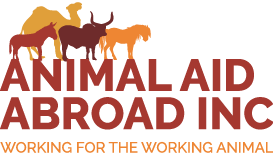MARES Donkey Sanctuary and Outreach Report - March 2023
Animal Aid Abroad supports animal welfare groups around the world, including Matabeleland Animal Rescue and Equine Sanctuary (MARES) based in Zimbabwe. MARES held the March donkey welfare outreach on the 15th and 16th of March, in Mabale, a community adjacent to the Hwange National Park area. The outreach venue was near the dip tank, at the place where Chief Neukomba Dingani of Hwange, has allocated land for the building of a community donkey welfare sanctuary. The outreach program entailed distribution of harnesses and fixing of scotch-carts, as well as ground-breaking activities at the new site where injured donkeys will be kept during rehabilitation and where the donkey fodder program will be conducted.
5 families had their scotch-carts done, meaning that 10 donkeys were fitted with humane padded harnesses and bell straps which reduce damage caused by wire, and neck reflectors to prevent accidents were also given.
Injured donkeys were also treated by the Veterinarian and most of these injuries were caused by poor harnessing, tick wounds and bite wounds caused by wild animals like hyenas/lions. Most of the donkeys also need the farrier to attend to all overgrown hooves and other hoof problems. This has been as a result of the rains and soft ground, preventing the hooves being worn down naturally. This makes the construction and fencing of the Mabale Site, a matter of urgency so that donkeys can be rested and kept safe from wild animal attack and abuse during their rehabilitation.
The second day (16 March, 2023), was earmarked for ground-breaking at the new site allocated by Chief Dingani for building the new MARES Mabale Donkey Sanctuary. Here, there will be construction of stalls to provide shelter for injured donkeys that will be in rehabilitation as well as accommodation for a community member who will be assigned to look after the injured donkeys as well as the moringa trees. The site will be fenced which will include the borehole and solar panels to ensure protection. This project also involves the growing of fodder for feeding donkeys at Mabale especially during the winter dry season. There will be planting of Moringa trees which will be harvested and processed to produce this fodder which according to research is highly nutritious. Already, Moringa trees have been geminated and are ready for planting.
The Mabale outreach program was a success, and this welfare program had a positive impact with regards to training villagers in donkey welfare. The villagers were also grateful for the harnesses and the vaccinations done on their donkeys. Moreover, the MARES/Mabale Donkey Sanctuary project promises to have a positive impact and will be a step in the right direction in the drive to promote donkey welfare and sustainable development and empowerment in rural communities.








